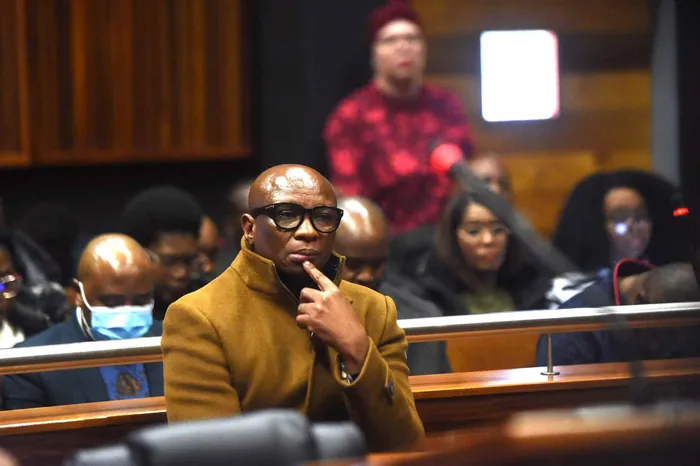OPINION: SA has a great opportunity to appoint a real Sports Minister

Zizi Kodwa resigned as Sports Minister after appearing in court on corruption charges this week. Photo: ITUMELENG ENGLISH Independent Newspapers
Comment by Herman Gibbs
Now that corruption-accused Zizi Kodwa has resigned as Minister of Sport, Arts and Culture, the country has a gilt-edged opportunity to restore the ailing health of South African sport.
Kodwa, along with many of his predecessors, including Fikile Mbalula, Thulasi Nxesi, Tokozile Xasa and Nathi Mthethwa, were never known to have had contact with sport previously, and had no understanding of it either.
Their appointments were in line with the ruling party’s policy of cadre deployment. It seems President Cyril Ramaphosa, who made the appointments, did not see the need for them to have at least some understanding of sport – or perhaps even show some excitement for sport.
During speeches or public addresses, their lack of basic sports knowledge was exposed. A classic example is Mbalula, who was once called up to bid farewell to John Smit’s World Cup-bound Springboks. All he could say was “moer hulle (hit them)”, which is what one is likely to hear when the Springboks pass through the Cape Flats.
The aforementioned ministers had little or no idea of what was expected from them as the custodians of sport in the country. They relied on officials from the Department of Sport to provide them with speeches and day-to-day guidance.
MEDIA STATEMENT
— Department of Sport, Arts and Culture (@SportArtsCultur) June 5, 2024
Zizi Kodwa resigns as Sport, Arts and Culture minister
Mr Zizi Kodwa, MP, announces his immediate resignation as Minister of Sport, Arts and Culture. This comes as Mr Kodwa challenges the charges against him, which he strongly denies. pic.twitter.com/582A1hovrs
Possibly the biggest evil under Kodwa’s watch was the way the administration of boxing slumped to an all-time low, both at professional and amateur levels. Boxing is run by the national government, and falls under the jurisdiction of the Department of Sport.
The boxers under the SA National Boxing Organisation (SANABO) umbrella are spitting fire because SA did not send boxers to the Olympic qualifiers. Consequently, there will be no SA boxers at this year’s Paris Olympics.
Professional boxing has been in a crisis, and over the past few months, new Boxing SA boards were appointed on two occasions.
The board administers professional boxing in the country. Their day-to-day functions and many of their operations are determined by the South African Boxing Act. These are acts of Parliament, signed by the President and published in the Government Gazette.
However, board officials are known to break these laws at random.
A classic example is the law that stipulates payment by prescribed dates for a deposit fee for the staging of the tournament, or the deposit of the fighters’ purses.
Officials have taken it upon themselves to break the law by allowing promoters to pay later. Board officials who break the law can be arrested.
The board elected earlier this year included officials who had never been to a boxing event before. Thankfully, they were disbanded and replaced with people known to the boxing fraternity.
MEDIA STATEMENT
— Department of Sport, Arts and Culture (@SportArtsCultur) May 14, 2024
Minister @zizikodwa is pleased to appoint members of the @BoxingSA_boxing board, in line with the South African Boxing Act 11 of 2001. Members of the new BSA board are appointed for a three-year term which begins on 14 May 2024 and ends on 14 May 2027. pic.twitter.com/c9ZxOLQb0R
Apart from boxing, the biggest outcry is the government’s lack of activity for school sports organisations, and failure to provide basic sports facilities at schools.
This has led to a lack of transformation because the entire population does not have access to basic facilities for them to thrive in their chosen sports.
Perhaps the SA government should take a page out of Zimbabwe’s book after they appointed former Olympic swimmer Kirsty Coventry to head their Ministry of Youth, Sport, Arts and Recreation.
President @CyrilRamaphosa has appointed Minister Maropene Ramokgopa to act as Minister of Sport, Arts and Culture until a permanent appointment is made under the new 7th administration. https://t.co/hVkvxkZbKv
— The Presidency 🇿🇦 (@PresidencyZA) June 7, 2024
Since the SA government has shown they are incapable of appointing a competent Minister of Sport, they will do well to follow the example of the late President Nelson Mandela.
There was a time when SA professional football was in a mess, and he turned to his British counterpart John Major for assistance. The UK gave him the very capable (the late) Trevor Phillips, and paid his salary as well.
Since then, professional football has flourished, and is one of the strongest leagues on the African continent.
Related Topics: